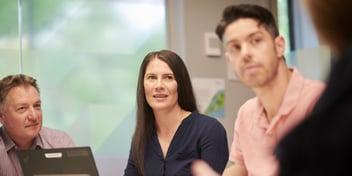Why gender equality is crucial to achieving a circular economy

As sectors across Australia and around the world continue towards a circular economy, two leading water managers from Veolia say gender equality and workforce diversity are critical in meeting the challenges ahead.
There are plenty of roles that need to be filled to deliver a circular economy, and ensuring diversity will allow the benefits of the transition to be fully realised and also drive innovation and garner long-term benefits.
Veolia General Manager for Water (NSW) Catherine Port and Deputy General Manager for Water (Victoria) Amanda Hazell are dedicated to an equitable transition to a circular economy — and ensuring inclusive workplace culture is fundamental to their approach.
While the change required is huge, Port said there are also big opportunities to create positive effects for everyone involved.
“The shift to a circular economy presents an amazing opportunity. It’s very rare to get the chance to be involved in making such a landmark shift in how the world works,” she said.
“And it's really on us to make sure the impact is positive and that everyone, including women and people from diverse backgrounds, are involved. We need diversity to be able to get this change happening and achieve ecological transformation to mitigate the impacts of climate change.”
Hazell said that ensuring diversity and inclusion is about ensuring a just transition into what will be a new world order.
“Veolia is determined to make that future much better for everyone. And we recognise that diversity will help us to make it happen,” she said.
As most water professionals already know, transitioning to a more sustainable future is not going to be simple or easy, but Hazell and Port agree that nurturing and bolstering diverse workforces is key to meeting the challenges.
“Veolia is working hard to make sure we are advancing innovation and technology to be able to make the circular economy work. We need all minds to solve these problems, which is why diversity is so important to us,” Port said.
Leading diversity
One of the ways Veolia is championing equitable change is by making diversity visible in the organisation, Hazell said, with the appointment of a female global CEO, Estelle Brachlianoff, and the recruitment of leaders from diverse backgrounds across Veolia ANZ, supporting teams to reach further.
“With Estelle leading the global organisation, and an increasingly diverse executive committee locally, including Emma Brand who leads our New Zealand water operations, we’re setting a good tone of equality in our sector,” she said.
“Having diverse people in leadership roles creates an environment that demonstrates that diversity is welcome and a valuable contribution to the way we work as an organisation.
“And supportive environments, where people are encouraged to try new things and things that are outside their comfort zone, are important for innovation.
“Where there is an environment where people are encouraged to extend their skills and are supported to do so, opportunities for women and others from diverse backgrounds increase.”
Furthermore, Port said Veolia talks openly about diversity and inclusion and why it’s important at all levels of the business in order to ensure continued momentum and proactive engagement.
“We actively look to increase diversity in our teams and build a pipeline of emerging professionals from diverse backgrounds across a number of fields and career pathways,” she said.
“We also look at our supply chain and how we can support and develop diversity — for example, through Indigenous procurement. We are dedicated to sharing and celebrating the strength of diversity that comes from our global presence.”
On a more personal level, Port said she aims to drive diversity within her teams by promoting an inclusive culture that enables people to bring their authentic self to work, and to ensure they are supported.
“Inclusion plays a big part in fostering diversity, so fostering an inclusive culture as part of who we are is very important to me,” she said.
“In addition to that, it’s about being very deliberate to create diversity when forming teams and putting measures in place to ensure we are supporting pathways into and through our business for professionals from a range of backgrounds to grow and develop.
“Promoting peer-to-peer mentoring and the forming of support networks also helps people to be successful.”
Hazell said her approach to supporting diversity in her teams is about getting to know the people she works with and meeting them as individuals.
“It’s very important for me to take the time to understand the people in my team. So often we just look at the visible signs of diversity, like gender and culture,” she said.
“But diversity of thought and experience is just as valuable. And we can’t make the most of that unless we know who people are.”
Innovating together
On a broader scale, Hazell said bolstering effective collaboration across and between sectors, and ensuring gender equality in the transition towards a circular economy, ensures that solutions are as innovative — and equitable — as possible.
“We need a sustained commitment to working together by getting different sectors and industries to collaborate. It’s difficult to get the economics to stack up for innovative solutions when different sectors try to do things alone,” she said.
“But if we have diverse people collaborating across sectors, there’s every chance we’ll find innovative and effective solutions.”
Hazell said that when diversity is naturally part of what companies strive to become, the benefits become inherent to the work they do.
“We begin to find a lot of value, and it snowballs. Working with utilities, I’ve seen the benefits that begin rolling in once diverse teams have been created,” she said.
“We need to make sure we provide the space for this to happen; we need to provide opportunities for people to work on these interesting challenges, knowing that it'll be for everyone’s benefit in the long term.”
In order to foster a culture of diversity and inclusion, Port said organisations across different sectors need to take both a top-down and a bottom-up approach, and ensure they make the space for diversity to blossom.
“Similarly, to bring about the change, we must work from the top and the bottom. It’s important to be quite conscious and deliberate about diversity and inclusion from a leadership point of view and young talent,” she said.
“We must make sure that we are providing an environment in which people feel they belong, so that diversity blossoms organically from all areas of the business.”
Equal transition
Including women and a broad diversity of people in the transition will not only help achieve a sustainable future, Port said, it also produces a raft of added benefits for organisations as well as the communities they serve.
“There are a lot of people that are disadvantaged by the structures that are currently in place. One of the effects of ensuring diversity as we transition into the circular economy is that we can correct this imbalance,” she said.
Port said women are huge change agents, which is exactly what all sectors currently need to transition to a circular economy.
“Women play a central role in influencing behaviours, whether it’s changing the workplace or changing the dynamics at home,” she said.
“It’s really important that we harness the power women have in enabling the transition to a greater circular economy.”


